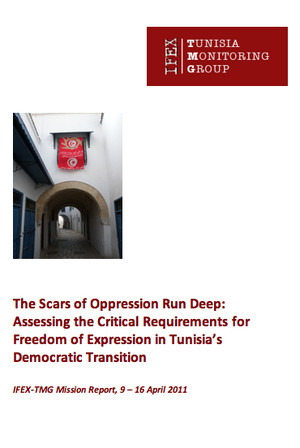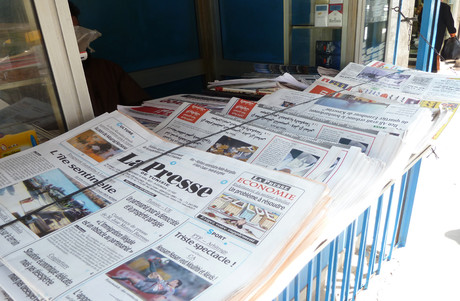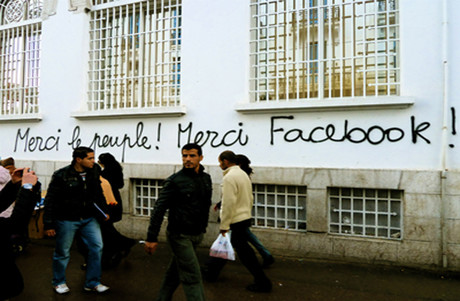“The Scars of Oppression Run Deep: Assessing the Critical Requirements for Freedom of Expression in Tunisia’s Democratic Transition” was presented on Thursday, 16 June to national and international media and local civil society groups at a press conference held in Tunis. It provides a sample of opinions gathered from a broad cross-section of over 60 media professionals, civil society advocates and authorities interviewed in Tunisia during the course of the IFEX-TMG mission that took place from 9 to 16 April.
The IFEX-TMG has been working since 2004 to campaign to raise awareness of free expression violations in Tunisia and to support independent journalists, writers, and civil society activists in their struggle to end censorship in the country.
The latest mission, the eighth formal mission, was designed to respond to the immediate needs of stakeholders, old and new, in their efforts to sustain freedom of expression in a post-Ben Ali Tunisia. The report published in English, Arabic and French can be downloaded below.
“In stark contrast to previous missions, the IFEX-TMG delegation was able to meet and talk openly with civil society groups, human rights activists, journalists, bloggers and representatives from across the political spectrum,” said Virginie Jouan, representing the World Association of Newspapers and News Publishers (WAN-IFRA), the mission’s lead organisation.
The report documents the key concerns and immediate challenges regarding censorship and freedom of expression in Tunisia. Recognising the advances that have already been made since 14 January, it also addresses the fundamental issues raised by key stakeholders with regards to maintaining the momentum of change and ensuring the widest participation for the democratic transition to succeed.
"Revolutions are living things, evolving day by day, and if they are to thrive participation is the key,” said Rohan Jayasekera of Index on Censorship, Chair of the IFEX-TMG. “Democracy needs the widest possible engagement and the broadest range of opinion, and while citizen journalists and web activists still have a job to do as guarantors of the Tunisian revolution, Tunisia's interim government and much of the mainstream media still have to prove themselves to the people."
In a detailed set of recommendations, the report outlines the work required by the transitional government, civil society groups, the media and consultative bodies in order to guarantee freedom of expression in the country. The most immediate concerns include:
- To redress the lingering effects of the former regime that are having a negative effect on the transition process across many areas of society, and in particular the media.
- To ensure plural voices are heard and informed debates undertaken so that the people of Tunisia can continue to effectively engage and shape their own futures.
- To support Tunisian journalists in their ongoing efforts to strengthen professional skills and standards, particularly in view of the forthcoming elections.
The report is only a starting point for the campaign to end censorship. Further IFEX-TMG activities are planned throughout the year as part of the coalition’s ongoing support to the Tunisian media and its continued monitoring of freedom of expression.
For more on IFEX-TMG, visit http://ifex.org/tunisia/tmg/ or find IFEX-TMG at http://www.facebook.com/IFEXTMG and on Twitter @TunisiaMonitor
IFEX Tunisia Monitoring Group
Rohan Jayasekera, Chair
c/o Index on Censorship
London
United Kingdom
rj@indexoncensorship.org
Phone: +44 20 7324 2522
Arabic Network for Human Rights Information
ARTICLE 19: Global Campaign for Free Expression
Bahrain Center for Human Rights
Cairo Institute for Human Rights Studies
Canadian Journalists for Free Expression
Cartoonists Rights Network International
Egyptian Organization for Human Rights
Index on Censorship
International Federation of Journalists
International Federation of Library Associations and Institutions
International Press Institute
International Publishers Association
Journaliste en danger
Maharat Foundation (Skills Foundation)
Media Institute of Southern Africa
Norwegian PEN
World Association of Community Radio Broadcasters
World Association of Newspapers and News Publishers
World Press Freedom Committee
Writers in Prison Committee, PEN International






